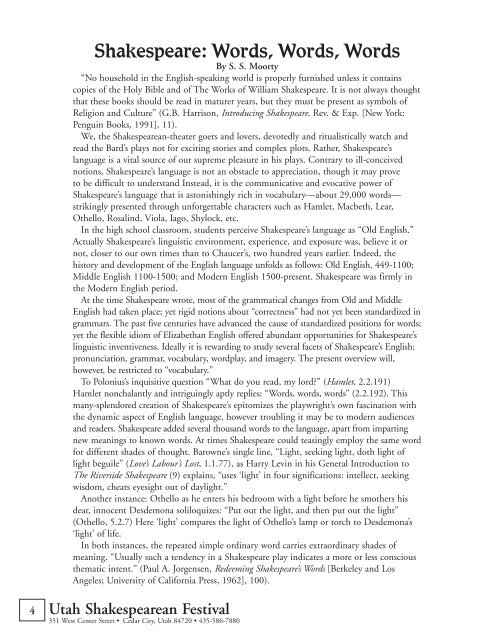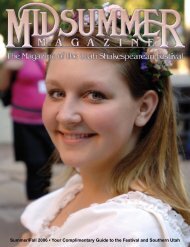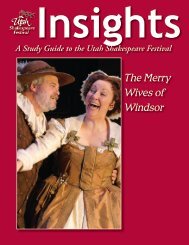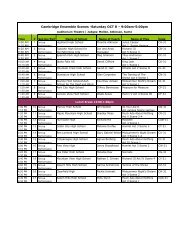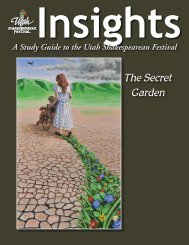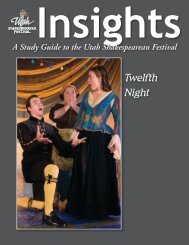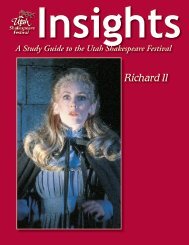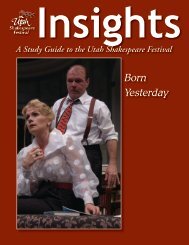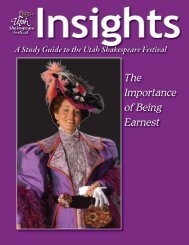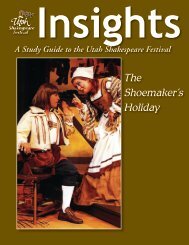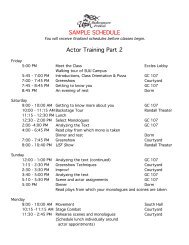Romeo and Juliet - Mr. Robertson's Bunker
Romeo and Juliet - Mr. Robertson's Bunker
Romeo and Juliet - Mr. Robertson's Bunker
You also want an ePaper? Increase the reach of your titles
YUMPU automatically turns print PDFs into web optimized ePapers that Google loves.
Shakespeare: Words, Words, WordsBy S. S. Moorty“No household in the English-speaking world is properly furnished unless it containscopies of the Holy Bible <strong>and</strong> of The Works of William Shakespeare. It is not always thoughtthat these books should be read in maturer years, but they must be present as symbols ofReligion <strong>and</strong> Culture” (G.B. Harrison, Introducing Shakespeare. Rev. & Exp. [New York:Penguin Books, 1991], 11).We, the Shakespearean-theater goers <strong>and</strong> lovers, devotedly <strong>and</strong> ritualistically watch <strong>and</strong>read the Bard’s plays not for exciting stories <strong>and</strong> complex plots. Rather, Shakespeare’slanguage is a vital source of our supreme pleasure in his plays. Contrary to ill-conceivednotions, Shakespeare’s language is not an obstacle to appreciation, though it may proveto be difficult to underst<strong>and</strong> Instead, it is the communicative <strong>and</strong> evocative power ofShakespeare’s language that is astonishingly rich in vocabulary—about 29,000 words—strikingly presented through unforgettable characters such as Hamlet, Macbeth, Lear,Othello, Rosalind, Viola, Iago, Shylock, etc.In the high school classroom, students perceive Shakespeare’s language as “Old English.”Actually Shakespeare’s linguistic environment, experience, <strong>and</strong> exposure was, believe it ornot, closer to our own times than to Chaucer’s, two hundred years earlier. Indeed, thehistory <strong>and</strong> development of the English language unfolds as follows: Old English, 449-1100;Middle English 1100-1500; <strong>and</strong> Modern English 1500-present. Shakespeare was firmly inthe Modern English period.At the time Shakespeare wrote, most of the grammatical changes from Old <strong>and</strong> MiddleEnglish had taken place; yet rigid notions about “correctness” had not yet been st<strong>and</strong>ardized ingrammars. The past five centuries have advanced the cause of st<strong>and</strong>ardized positions for words;yet the flexible idiom of Elizabethan English offered abundant opportunities for Shakespeare’slinguistic inventiveness. Ideally it is rewarding to study several facets of Shakespeare’s English:pronunciation, grammar, vocabulary, wordplay, <strong>and</strong> imagery. The present overview will,however, be restricted to “vocabulary.”To Polonius’s inquisitive question “What do you read, my lord?” (Hamlet, 2.2.191)Hamlet nonchalantly <strong>and</strong> intriguingly aptly replies: “Words, words, words” (2.2.192). Thismany-splendored creation of Shakespeare’s epitomizes the playwright’s own fascination withthe dynamic aspect of English language, however troubling it may be to modern audiences<strong>and</strong> readers. Shakespeare added several thous<strong>and</strong> words to the language, apart from impartingnew meanings to known words. At times Shakespeare could teasingly employ the same wordfor different shades of thought. Barowne’s single line, “Light, seeking light, doth light oflight beguile” (Love’s Labour’s Lost, 1.1.77), as Harry Levin in his General Introduction toThe Riverside Shakespeare (9) explains, “uses ‘light’ in four significations: intellect, seekingwisdom, cheats eyesight out of daylight.”Another instance: Othello as he enters his bedroom with a light before he smothers hisdear, innocent Desdemona soliloquizes: “Put out the light, <strong>and</strong> then put out the light”(Othello, 5.2.7) Here ‘light’ compares the light of Othello’s lamp or torch to Desdemona’s‘light’ of life.In both instances, the repeated simple ordinary word carries extraordinary shades ofmeaning. “Usually such a tendency in a Shakespeare play indicates a more or less consciousthematic intent.” (Paul A. Jorgensen, Redeeming Shakespeare’s Words [Berkeley <strong>and</strong> LosAngeles; University of California Press, 1962], 100).4Utah Shakespearean Festival351 West Center Street • Cedar City, Utah 84720 • 435-586-7880


